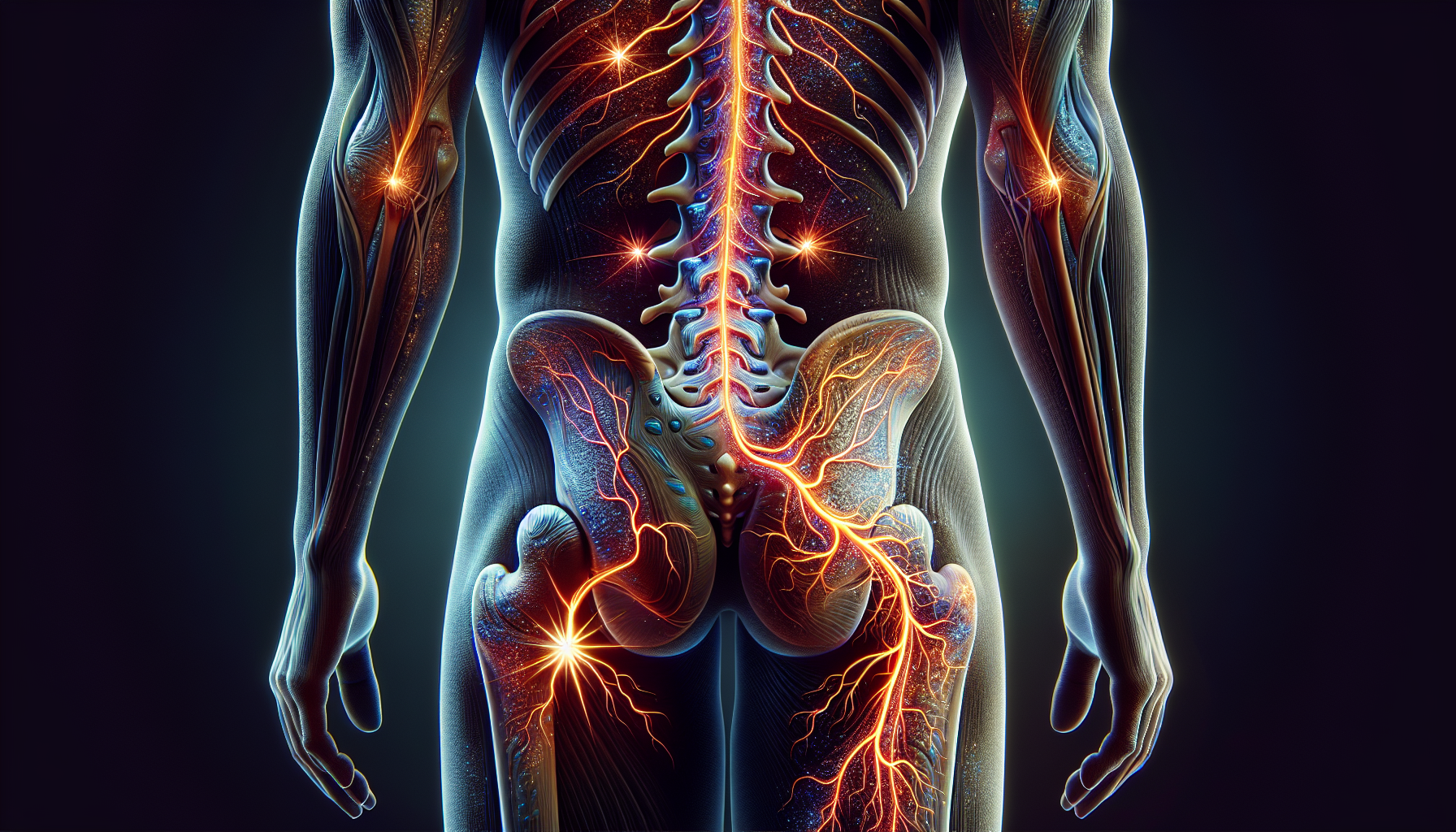Dealing with sciatica can be incredibly challenging, as the sharp, radiating pain caused by nerve compression often disrupts daily life. Whether it’s due to spinal stenosis, herniated discs, or prolonged sitting, sciatica pain is becoming more common today than it was 50 years ago. Modern sedentary lifestyles, higher rates of obesity, and an aging population all contribute to this trend, leaving many individuals searching for effective pain relief. In addition to physical therapy and other treatments, specific vitamins and minerals can significantly manage sciatica symptoms and promote overall nerve health.
In this article, we’ll explore the best supplement for sciatica and how specific nutrients can help soothe irritated nerves, reduce inflammation, and improve blood circulation to relieve pain. Supplements such as vitamin B12, vitamin D, magnesium, and turmeric have anti-inflammatory and nerve regeneration properties that may help alleviate sciatic nerve pain and enhance overall well-being. Alongside these nutrients, incorporating holistic approaches like dietary changes and mind-body techniques can promote healing and help you live a more pain-free life. Let’s explore how these essential vitamins and holistic strategies can make a difference.
Key Takeaways
- Sciatica is caused by nerve compression or irritation, leading to sharp pain and discomfort that significantly impacts quality of life.
- Essential vitamins such as B12, D, and C, along with minerals like magnesium and turmeric, play critical roles in alleviating sciatica symptoms and promoting nerve health.
- Holistic approaches, including dietary changes, physical therapy, and mind-body techniques, are essential for effective sciatica pain management.
Understanding Sciatica and Its Symptoms

Sciatica is characterized by sharp, shooting pain that radiates from the lower back down through the legs, often resulting from an irritated or compressed sciatic nerve. This nerve pain is not only debilitating but can significantly impact one’s quality of life. For those experiencing sciatica, the quest for pain relief often becomes a top priority. Understanding the underlying causes and symptoms is crucial for managing sciatica effectively and finding appropriate treatment options.
Vitamins play a crucial role in alleviating sciatica symptoms and enhancing nerve health. Supporting overall nerve function, these essential nutrients can reduce sciatic pain severity and promote a pain-free lifestyle. Understanding how vitamins aid in managing sciatica begins with exploring the common causes and recognizable symptoms of this condition.
Common Causes of Sciatica
Sciatica can manifest suddenly due to injuries or develop gradually from underlying conditions such as arthritis. One of the most common causes of sciatic nerve pain is disc herniation, where a herniated disc presses against the nerve roots, leading to significant discomfort and pain. Spinal stenosis, a condition where the spinal canal narrows, is another known contributor to sciatica pain. These conditions can lead to irritated nerves, producing the sharp, shooting pain commonly associated with sciatica.
In today’s world, sciatica is becoming more prevalent and driven by key lifestyle factors. Sedentary lifestyles are a major contributor, as prolonged sitting compresses the spine, increasing the likelihood of conditions like herniated discs. Additionally, the global rise in obesity places more strain on the spine, further exacerbating nerve pain. As the population ages, conditions like spinal stenosis and arthritis, which affect bone and muscle health, become more common, increasing sciatica symptoms. A lack of physical activity, which weakens core muscles needed for proper nerve function and spinal support, also heightens the risk of developing sciatica.
Another less common but notable cause of sciatica is piriformis syndrome, which involves the piriformis muscle in the buttocks and can irritate or compress the sciatic nerve, leading to sciatic pain. Recognizing these causes and lifestyle contributors helps individuals suffering from sciatica seek appropriate treatment and pain relief strategies, such as physical therapy, supplementation, and holistic approaches to alleviate symptoms and improve their quality of life.
Recognizing Sciatica Symptoms
Identifying sciatica symptoms is key to effective management of the condition. Sciatica pain can vary widely, ranging from mild tingling to severe, debilitating pain. It often occurs on one side of the body and may include sharp pain in the leg or hip and numbness in other areas. This nerve pain not only disrupts daily activities but can also affect sleep and overall well-being.
In addition to pain, sciatica symptoms can include numbness or weakness in the affected leg, making it challenging to perform routine tasks. These symptoms can extend from the lower back through the legs and might be accompanied by muscle spasms and other discomforts.
Early identification of these symptoms can facilitate timely medical advice and effective pain relief solutions.
Essential Vitamins for Sciatica Relief

Managing sciatica pain often involves a multifaceted approach, and incorporating essential vitamins into one’s diet can be a significant part of this strategy. Key beneficial vitamins for sciatica relief include Vitamin B12, Vitamin D, and Vitamin C. These vitamins support nerve health, reduce inflammation, and promote overall well-being.
Understanding how these vitamins alleviate sciatic nerve pain allows individuals to make informed dietary and supplement choices.
Vitamin B12: Supporting Nerve Function
Vitamin B12 is essential for proper nerve function and supports the nervous system by promoting the production of myelin, the protective sheath around nerves. This vitamin is particularly beneficial for individuals experiencing nerve-related pain, as it helps prevent conditions like neuropathy and nerve damage. Incorporating Vitamin B12 supplements into a daily routine can support overall nerve health and potentially relieve sciatica pain by improving nerve regeneration and reducing inflammation.
Adequate intake of Vitamin B12 is crucial for optimal nerve function. This vitamin significantly reduces nerve pain and soothing irritated nerves caused by sciatica. Whether obtained through dietary sources or supplements, maintaining proper levels of Vitamin B12 is vital in managing sciatica symptoms effectively.
For more information on incorporating Vitamin B12 into your wellness regimen, check out our article, "Everything You Should Look for In a Vitamin B Complex Liquid Supplement." This guide introduces five top B Complex liquid supplements, all containing Vitamin B12, to help promote nerve health and alleviate symptoms of conditions like sciatica. This carefully selected list will save you time choosing the best liquid B Complex supplement.
Vitamin D: Enhancing Bone and Muscle Health
Vitamin D is another essential nutrient in maintaining bone and muscle health and is crucial for individuals with sciatica. This vitamin aids in calcium absorption, supporting strong bones and muscles and helping to prevent conditions that may lead to sciatic nerve pain. A deficiency in Vitamin D can lead to weakened bones and muscles, increasing the risk of developing sciatica.
Supplementing with Vitamin D can help reduce inflammation and improve nerve function, making it an important element in managing chronic back pain. Adequate levels of this vitamin support overall bone and muscle health, reducing the likelihood of sciatic pain and promoting a pain-free lifestyle.
Vitamin C: Boosting Collagen and Reducing Inflammation
Vitamin C plays a vital role in collagen production, which is essential for tissue repair and reducing inflammation related to nerve pain. Collagen helps maintain the structural integrity of tissues, which is crucial for promoting healing in areas affected by sciatica symptoms. By boosting collagen synthesis, Vitamin C aids in the repair and regeneration of damaged tissues, helping to alleviate sciatica pain and support bone and muscle health.
In addition to supporting collagen production, Vitamin C’s anti-inflammatory properties make it an important nutrient for managing sciatic nerve pain. Reducing inflammation is key to relieving irritated nerves and improving overall nerve health. Incorporating Vitamin C supplements or food sources into your daily routine can significantly benefit individuals suffering from nerve-related pain, promoting healing and reducing symptoms.
For those looking to add Vitamin C to their routine, we recommend checking out our article, "Your Guide to the Best Supplement for Vitamin C: Making Sense of Your Options." Finding a reliable source is crucial since the body does not naturally produce Vitamin C. This guide introduces five of the best Vitamin C supplements available today, which can help save time when choosing the most effective option for supporting nerve health and managing sciatica.
Key Minerals and Supplements for Sciatica Management

Beyond vitamins, certain minerals and supplements can also be crucial in managing sciatica. Key nutrients such as magnesium, turmeric (curcumin), and Alpha Lipoic Acid are essential for reducing inflammation and improving symptoms associated with sciatica.
By understanding how these supplements contribute to pain relief and nerve health, individuals can effectively enhance their approach to managing sciatica.
Magnesium: Relaxing Muscles and Soothing Nerves
Magnesium is well-known for its ability to relax muscles and soothe irritated nerves, making it particularly beneficial for individuals with sciatica pain. This essential mineral helps alleviate muscle spasms and reduce nerve-related pain, a common issue for those experiencing sciatica symptoms. Ensuring adequate magnesium intake, whether diet or supplements, can significantly improve muscle and nerve health.
Symptoms of magnesium deficiency, such as muscle cramps, twitching, and general muscular discomfort, can worsen sciatic nerve pain. By incorporating magnesium supplements into daily routines, individuals can support muscle relaxation, reduce spasms, and alleviate sciatica discomfort. Proper magnesium intake is critical in improving the overall well-being of sciatica patients.
For those looking to find the best form of magnesium, we recommend reading our article, "Magnesium Marvels: Discover the Five Best Magnesium Bisglycinate Chelate Supplements for Your Wellbeing." This guide introduces five of the top magnesium bis-glycinate chelate supplements, a highly absorbable and bioavailable form of magnesium. This valuable resource can save our readers a lot of time when selecting the best magnesium supplement for sciatica support and pain relief.
Turmeric (Curcumin): Natural Anti-Inflammatory Benefits
Turmeric is renowned for its powerful natural anti-inflammatory properties, primarily due to its active compound, curcumin. Curcumin has been shown to effectively inhibit inflammatory molecules and enzymes, helping to reduce inflammation and relieve pain. This makes turmeric a valuable supplement for managing sciatic nerve pain and other inflammation-related conditions. For individuals suffering from sciatica, curcumin's ability to target inflammation at its source provides much-needed relief and supports overall nerve health.
Given its potent anti-inflammatory effects, turmeric is gaining popularity as a natural solution for pain relief. Incorporating turmeric into the diet or taking curcumin supplements can help reduce inflammation, manage pain, and improve well-being for those with sciatica symptoms.
For more information on incorporating turmeric into your routine, check out our article, “The Top Turmeric/Curcumin Supplements For Joint Pain And Inflammation.” This guide reviews seven of the leading turmeric/curcumin supplements on the market, offering a detailed look at the many benefits of this incredible herb. This resource will be valuable for readers interested in using turmeric for pain relief and enhancing their health regimen.
Alpha Lipoic Acid: Improving Nerve Function
Alpha Lipoic Acid (ALA) is a potent antioxidant recognized for reducing oxidative stress that can damage peripheral nerves. Studies indicate that treatment with ALA can significantly alleviate pain and sensory symptoms in conditions like diabetic polyneuropathy and compressive radiculopathy, both of which involve nerve-related pain. Given these properties, ALA shows promise as a supplement for improving nerve function and supporting overall nerve health, making it particularly beneficial for individuals suffering from sciatica.
Clinical research suggests that Alpha Lipoic Acid helps protect against nerve damage by scavenging reactive oxygen species and supporting other antioxidants within the body. By incorporating ALA supplements into a daily regimen, individuals can benefit from improved nerve regeneration, reduced nerve pain, and better management of sciatica symptoms. This makes ALA a valuable part of a holistic approach to alleviating sciatica and supporting long-term nerve health.
For readers who want to explore Alpha Lipoic Acid's benefits further, check out our article, “Ever Wondered What Is Alpha-Lipoic Acid? Check It Out - We Think You Will Be Amazed!” This guide dives deep into the benefits of ALA supplements and introduces five of the top Alpha Lipoic Acid supplements on the market today. This carefully curated list will save time for those interested in adding ALA to their health regime, particularly for improving nerve function and managing sciatica pain.
Holistic Approaches to Sciatica Pain Relief

In addition to vitamins and supplements, holistic approaches can play a significant role in managing sciatica pain. Techniques such as proper spinal alignment, maintaining a healthy spine, and practicing mind-body techniques like meditation and yoga can significantly help alleviate sciatic pain.
Integrating these holistic methods enhances overall well-being and supports the journey to becoming pain-free.
Dietary Changes to Support Nerve Health
Dietary changes can profoundly impact nerve health and the management of sciatica symptoms. Including anti-inflammatory foods like fruits, vegetables, and omega-3-rich fish can help reduce sciatica symptoms and support overall nerve health. A diet high in leafy greens, healthy fats, nuts, and berries can significantly reduce inflammation associated with sciatica.
Additionally, avoiding processed and sugary foods can decrease inflammation and lower the risk of sciatica flare-ups. Making these dietary changes can be a practical approach to managing sciatica and improving overall nerve health. Focusing on a balanced, anti-inflammatory diet supports nerve function and reduces nerve-related pain.
Physical Therapy and Exercise
Physical therapy is essential for restoring mobility and reducing discomfort associated with sciatica. Regular physical therapy helps improve mobility and reduces sciatica pain through tailored exercises that enhance spinal stability and reduce sciatic nerve pressure. Engaging in yoga and other forms of movement can aid recovery from sciatic pain by enhancing flexibility and strength in the spine.
Working with a healthcare provider or physical therapist allows individuals to develop a personalized exercise plan addressing specific needs and supporting the journey toward pain relief and improved mobility. Physical therapy helps alleviate symptoms and promotes overall health and well-being.
Mind-Body Techniques for Pain Management
Mind-body techniques such as meditation and yoga can significantly enhance pain tolerance and improve overall pain management. Regular meditation practices can reduce stress levels, indirectly helping to relieve sciatica pain. Engaging in mindfulness meditation allows individuals to focus on the present moment, reducing the impact of pain on their daily lives.
Additionally, body scan meditation and guided visualization can help individuals become aware of tension in their body, promoting relaxation and potentially reducing pain. Incorporating these mind-body techniques into their routine allows individuals to manage sciatica more effectively and support their overall healing process.
Making Informed Decisions About Supplements

Making informed decisions about supplements is crucial for ensuring their effectiveness and safety. Consulting a healthcare provider before starting any new supplement is vital, as they can evaluate individual health needs and risks. Healthcare professionals can identify potential interactions between supplements and existing medications or health conditions, providing insights into the quality and safety of supplements.
A personalized assessment by a healthcare provider ensures informed choices regarding dietary supplementation. Working with a healthcare professional allows individuals to develop a tailored supplement regimen addressing specific needs, ensuring adequate intake of essential nutrients, and supporting their journey toward pain relief and improved nerve health.
Wrapping Up Our Discussion on Sciatica
In conclusion, managing sciatic nerve pain effectively requires a comprehensive and compassionate approach that integrates essential vitamins, key minerals, and holistic methods. With the rise in cases of sciatica due to lifestyle factors such as sedentary habits and spinal stenosis, more people are turning to natural supplements like vitamin B12, vitamin D, and vitamin C to support nerve health, reduce inflammation, and promote overall well-being. Minerals like magnesium and supplements such as turmeric and Alpha Lipoic Acid provide additional relief by supporting muscle relaxation, reducing nerve pain, and promoting nerve regeneration.
As individuals seek to alleviate sciatica pain today, combining nutritional strategies with holistic approaches, including dietary changes, physical therapy, and mind-body techniques, plays a crucial role in providing sciatica relief. This integrated approach helps relieve sciatica pain and fosters long-term nerve function and muscle health. Consulting a healthcare provider is essential for crafting a safe, personalized plan for managing sciatica, ensuring that the right supplements and treatments are tailored to individual needs.
As you navigate your path toward sciatica relief, the information in the linked articles within this guide can serve as a reliable starting point, offering valuable insights into the best vitamins and supplements available. Embracing these strategies may bring you closer to a pain-free, healthier, and more fulfilling life, supporting your journey to wellness and recovery.
Brief Answers to FAQs
What are the essential vitamins for sciatica relief?
For effective sciatica relief, it is crucial to include Vitamin B12, Vitamin D, and Vitamin C in your regimen, as they support nerve health, reduce inflammation, and promote collagen production. Prioritizing these vitamins can aid in managing sciatic nerve pain effectively.
How does Vitamin B12 help with sciatic nerve pain?
Vitamin B12 is essential for nerve function and myelin production, protecting against neuropathy and enhancing nerve regeneration, thereby reducing sciatic nerve pain. Its role in maintaining nerve health can significantly relieve nerve-related discomfort.
Can dietary changes impact sciatic nerve pain?
Yes, dietary changes can significantly impact sciatic nerve pain. Incorporating anti-inflammatory foods such as fruits, vegetables, and omega-3-rich fish may reduce inflammation and promote nerve health.
What role does physical therapy play in managing sciatica?
Physical therapy is vital in managing sciatica by restoring mobility and alleviating discomfort. Tailored exercises improve spinal stability, reduce pressure on the sciatic nerve, and enhance flexibility and strength.
Why is it important to consult a healthcare provider before taking supplements?
It is important to consult a healthcare provider before taking supplements to assess individual health needs and potential interactions with medications or health conditions. This ensures both the safety and efficacy of the supplements being considered.
Thanks for taking this journey to explore the best supplement for sciatica. If you want to add to your library of knowledge and are interested in diving deeper into some of the supplements mentioned in this article, you should check out the links above. It could be a huge time-saver - you won't be sorry you took a look.
Also, please return soon to check out our next review of other incredible supplements – we’re always looking out for YOU!
*We are NOT qualified medical advisors. The content here is only based on our personal opinions and research and should NOT be used as a substitute for a healthcare professional's advice!











Member discussion